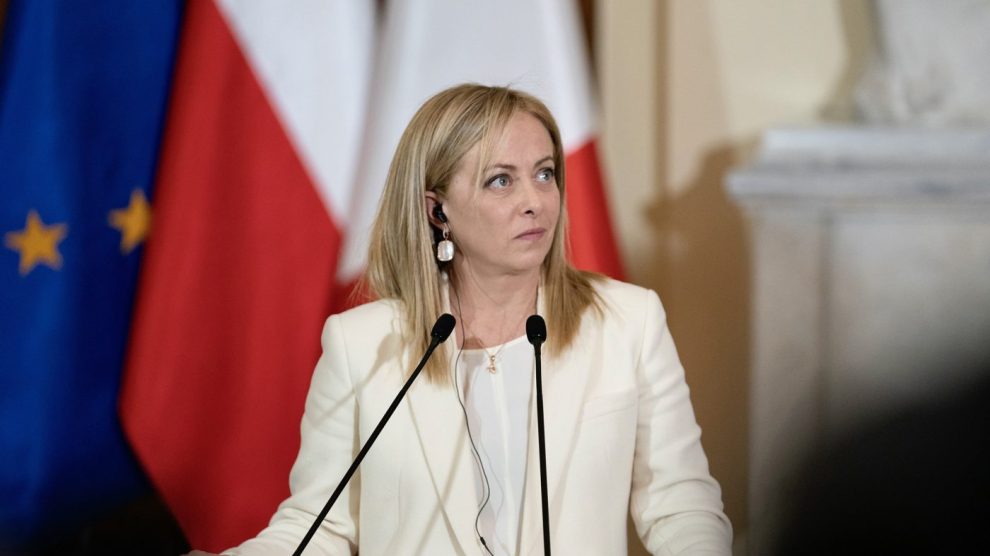Look East. After a flurry of diplomatic activity in the MENA area, Rome is shifting its attention to the Indo-Pacific. Prime Minister Giorgia Meloni will be the special guest at the Raisina Dialogue (a regional security conference organised by the ORF, the subcontinent’s most important think tank) upon the invitation of her Indian counterpart, Narendra Modi.
- Meeting on the sidelines of the Dialogue on Thursday, the Italian and Indian leaders will likely strike a new bilateral defence cooperation framework – signalling the overcoming of years-long diplomatic frictions.
- Laying the groundwork at the Aero India show in Bengaluru, Italy’s Undersecretary for Defence Matteo Perego Di Cremnago spoke with Indian Defence Minister Rajnath Singh and discussed shared commercial opportunities – including through Rome’s leadership in the defence sector – between Italy and India.
Next stop: the UAE. Defence matters will also underscore PM Meloni’s following trip. On Friday, she will make her way to Abu Dhabi – which is also interested in Rome’s industrial and intellectual defence capacity – and possibly meet with President Mohammed bin Zayed.
- In fact, a geostrategic connection system is being built between the Indo-Pacific and the enlarged Mediterranean. Both New Delhi and Abu Dhabi are lead actors in this plain through matters of energy, water, food, health, space and security – decisive topics for navigating the future.
The next big framework. A material incarnation of this framework is the I2U2 group, i.e. the mini-lateral mechanism through which Israel, India, the UAE and the US cooperate on the abovementioned topics. First theorised by Mohammed Soliman in a Middle East Institute essay, this format came to life in July 2022 when the countries’ leaders convened for their first meeting.
- As the US government noted at the time, “I2U2 reinforces the Biden-Harris’ administration’s goal to build on the Abraham Accords and other normalisation agreements to advance regional integration here in the Middle East.”
Could Italy become the third “I”? As Italy reconsiders its ties with China and increases its investment in the security of the Indo-Pacific region (including by sending there its top-class offshore patrol vessel and elevating its ties with Japan to “strategic”, also in light of the GCAP), there could be a chance for Rome to engage with such new, trans-regional multilateral systems.
- PM Meloni’s trips to India are clearly conducive to increasing Italian presence in the area, including in the political, commercial and security spheres.
- Meanwhile, Italian and Israeli diplomacies are working on a top-level meeting between PM Meloni and her Israeli counterpart Binyamin Netanyahu, which could take place as soon as next week in Rome.
The expert’s take. According to Mauro Bonavita, who co-coordinates a working group on the Indo-Pacific at King’s College London, India and Italy share a common idea for the Gulf. They see the maintenance of regional security as their foundation, and they are both very active in the dynamics affecting the area.
- “I believe that Italy must begin to engage in the Indo-Pacific without overextending itself, finding concrete hooks, consistent commitments, and a gradual presence: and that is why the Western Indian Ocean is one of the regional environments where Italian activities can begin to focus,” he told our sister website from New Delhi, where he is invited to take part in the Raisina Dialogue.
A natural fit. Indeed, when Italy is active with partnerships and collaborations (or political-geopolitical presence in general) within that system of connections that binds the Horn of Africa, the Red Sea, the Gulf of Aden and the Arabian Sea, and thus the Gulf and the Mediterranean, it becomes an active player along the Western Indo-Pacific ridge, argued Mr Bonavita.
- “This is why the gateway to the East passes through the improvement of diplomatic and economic relations, as well as involvement in regional dynamics, with the countries of the Indian Ocean perimeter. A geostrategic environment that borders on the enlarged Mediterranean, i.e. what Italy historically identifies as the sphere of its international projection.”




